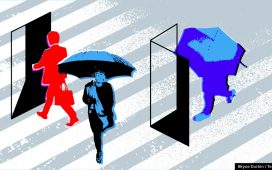Facebook canceled one of its advertising events, which is attended largely by employees, and its annual F8 conference — one of the company’s most anticipated events. That’s where it showcases its products and plans for the future to software developers. Mark Zuckerberg, the chief executive, is a mainstay at the event, giving a regular state-of-the-industry keynote address.
Karen Weise, my colleague in Seattle, had this tidbit to share: Employees at Amazon’s worldwide operations — the company’s largest division, which runs the technology and operations for warehouses, deliveries, Prime membership and physical stores, among other things — were told that they should not travel domestically or internationally “until further notice,” according to emails viewed by The New York Times.
Dave Clark, the senior vice president who runs worldwide operations, wrote in one of the emails that no group or team meetings requiring travel should be planned until at least the end of April, “by which time hopefully we have a better sense of the virus, its spread and impact.”
Amazon confirmed that Mr. Clark had emailed his organization on the matter. “We are watching this situation closely with a focus on the safety of our teams and ensuring we can meet customer promises,” an Amazon spokeswoman, Kelly Cheeseman, said in a statement. “We are closely following local and international health authority guidance as this situation progresses.”
The company had already been scrambling to make sure it doesn’t run out of popular products that are made in China, and has urgently emailed suppliers to see if they expect to have enough of their best sellers for its all-important Prime Day this summer.
Rather than forecasting the apocalypse, I’ve been engaging in a different thought exercise over the past few weeks: What less obvious companies might the coronavirus affect in ways we hadn’t anticipated?
Will Netflix, for example, see a drastic uptick in hours of streaming television watched, given people aren’t leaving their homes anymore? Or consider delivery companies like Uber Eats, DoorDash, Instacart, even Amazon. In a world where people are increasingly hesitant to go outside and mingle with others, will consumers start to rely more heavily on others doing the shopping for them?







